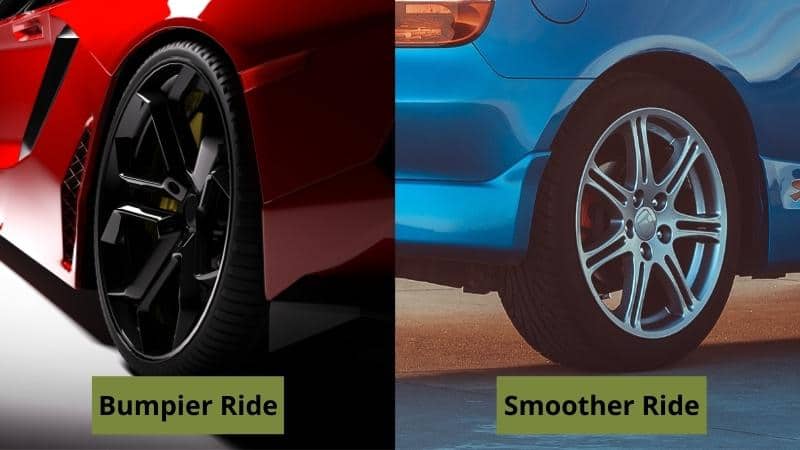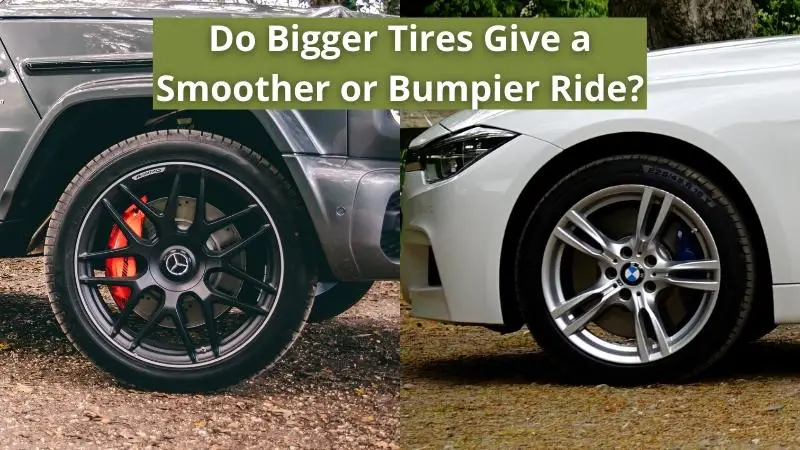Do you need a smooth ride? If yes, avoid bigger tires. One of the most accessible modifications to a car can be to fit it with some larger wheels, but it is good to note its effect on the acceleration and overall performance.
As a general rule, the bigger the tires, the rougher the ride. It is worth noting that switching to a smaller wheel will give you a smoother ride without much modification to your car. Using a thicker tire will also be an added advantage towards smooth riding.
Regardless of the vehicle type, larger wheels make the ride quality stiffer. However, they also improve stability and handling significantly. There are ways to have smooth ride quality and good strength and handling.
For example, the stiffer ride quality from using bigger wheels to improve stability and handling can be counterbalanced with the proper tires and adaptive suspension dampers. This feature is most typical on Mercedes-Benz vehicles.
In the end, what you value in your car will be the primary factor when choosing wheel size.
Other Things That Affect Ride Quality
It’s not easy to pin down the culprit for rough ride quality. This owes to the many factors that tend to increase or decrease the smoothness of your ride. These include:
- Suspension
- Car weight
- Transmission
- Seats
- Horsepower and torque
- Engine size and timing
- Poorly maintained road
- Weight and distribution
- Condition and type of the tires
Even though larger-diameter wheels and tires tend to improve handling in addition to high-speed performance, lower-profile tires also lead to a firmer ride.
They may be noisier than the more minor, standard rubber. Larger wheels are more expensive. The bigger you go, the more costly the wheels and tires.
What Tire Size Makes a Car Ride Smoother?

Having large wheels and low profile tires, a tire with a short sidewall, transmits more feedback from the road to the occupant compartments, resulting in a bumpier ride.
Replacing them with smaller wheels and higher profile tires will allow for a smoother ride since the taller tires can absorb more impact from the road.
How do Bigger Tires Affect Performance?
Upsizing the diameter of your wheel may also grow the end reduction ratio.
This has two effects:
- Reduction of acceleration potential.
- Higher top speed.
To be precise, if your car has a bigger wheel, it will take a longer time to accelerate, though it will attain a higher speed.
Do 20-Inch Wheels Ride Rough?
Because of the decreased sidewall, 20-inch tires are likely to increase the discomfort you feel when going over potholes, speed bumps, gravel roads, and other road hazards. 20-inch tires are not the best when it comes to off-roading.
Final Words
In conclusion, before you replace or change your car wheels, think about what you need. If you don’t need much noise and vibration, get smaller wheels. On the other hand, if your goal is shorter braking distance and/or stability, then acquire larger wheels.
Therefore, consider buying a wheel that won’t challenge you during mounting or make your riding experience rough.
Hi, my name is Niklas, the head content creator & CEO of Whirling Wheelz. I am very interested in vehicles of all kinds, mainly cars. I have a car mechanics degree from high school and a big hobby of mine is to follow the WRC (World Rally Championship) both online and through travel.

